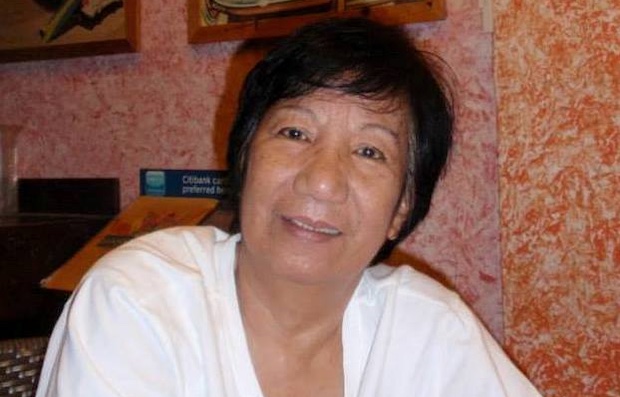
Lualhati Bautista (Photo from her Facebook page)
MANILA, Philippines — Best known for the novels “Dekada ’70” (1983) and “Bata, Bata… Pa’no Ka Ginawa?” (1988) as well as her steadfast activism, Lualhati Bautista died after losing her battle with cancer in her home on Sunday morning at the age of 77.
With her work particularly identified with the martial law era and women’s rights, she stood up for what she wrote about. She often spoke publicly or took to the streets in protest against historical distortion and oppression.
In 2020, Jefferson Lodia Badong accused Bautista on Facebook of being a member of the New People’s Army, a charge she denied. Badong later apologized publicly, deleted his posts and soon after deactivated his account. Bautista said Badong had sent her a private apology.
Though best known for her prolific output as a much-awarded fictionist, she was also a screenwriter. Two of her novels were adapted into films with Vilma Santos in the lead, as Lea Bustamante in “Bata, Bata” in 1998 and Amanda Bartolome in “Dekada” in 2002.
In a text message she sent to the Inquirer, Santos thanked Bautista “for her trust and guidance so that I could properly play the parts of Lea Bustamante and Amanda Bartolome.”
“‘Bata, Bata… Pa’no Ka Ginawa’ and ‘Dekada ’70’ are two of the most unforgettable movies in my life as an artist. You will be greatly missed, Lualhati. Even if you are gone, we are still here and will continue to stand and fight for the rights of women in our society,” the actress said.
‘Dekada’ in English
The prestigious Penguin Classics imprint had offered to publish the English translation of “Dekada” internationally, Bautista announced on Facebook in 2022.
Karina Bolasco, director of the Ateneo de Manila University Press, confirmed this in a Viber message to the Inquirer.
“They were just waiting to sign a contract as she got sick by that time. It’s a landmark as it will be the first Filipina and first work in Filipino to be featured in Penguin classics. All the previous ones were by men who wrote in English (except, of course, ‘Noli Me Tangere’ and ‘El Filibusterismo’ by José Rizal),” Bolasco said.
Widely considered to be the best writer in Filipino who has yet to be named a national artist for literature, Lualhati Torres Bautista was born on Dec. 2, 1945, in Tondo, Manila, to writer/director Esteban Bautista and Gloria Torres.
According to her, she started writing at the young age of 16. “By then, I already had a published work. But I had been writing stories since I learned how to read and write.”
Growing up, she was also a voracious reader of popular Filipino literature. “I grew up on Liwayway magazine,” Bautista told the Inquirer in a 1999 interview. “I read a lot of komiks and listened to radio dramas. I guess the last one I had to, because my mom was a lover of soap operas.”
It was thus no surprise that her first published work, the short story “Katugon ng Damdamin” in November 1963, would be in Liwayway—the publication that had molded her. The story would be the first of many that she would write for the publication.
Depicting the realities
The biggest inspiration for her work was always real life: “I get inspired by what I see. There was a time when I was really moved when a child was run over by a speeding car. I felt at once that I wanted to write about what had transpired in his life before the accident. I like telling stories. When I was still studying, I was often told that I was ‘very talkative.’ My teacher would often tell me to keep my mouth shut. Then I finally decided to just write down the things that I could not blurt out,” she said.
Bautista was studying journalism at the Lyceum of the Philippines (now Lyceum of the Philippines University) when she dropped out to become a full-time professional writer.
She won the grand prize for the novel in Filipino at the Carlos Palanca Memorial Awards for Literature for “‘GAPÔ” in 1980, “Dekada” in 1983 and “Bata, Bata” in 1984. She also received the same award for short stories in 1982 and 1983 with her fiction unflinchingly depicting the realities of life during martial law.
Favorite work
She was the writer of 10 books and author of 11 screenplays. “Bulaklak ng City Jail,” starring National Artist for Film and Broadcasting/Broadcast Arts Nora Aunor, won Bautista the best story and best screenplay awards in the 1984 Metro Manila Film Festival. She also received the CCP Gawad Para sa Sining in 2020.
Of all her work, Bautista singled out “Bata, Bata” as her favorite, with “Dekada” a close second.
“With ‘Bata, Bata…,’ my enthusiasm never died down. When we were doing the movie, I was attending presscons and premieres. Of course, I also treasure my having done ‘Dekada,’ but ‘Bata, Bata…’ had created a greater impact in the market.”
Directed by Chito S. Roño, it also won best picture and best screenplay from the Gawad Urian Awards and best story from the Famas Awards.
Funeral arrangements have yet to be announced as of this writing.